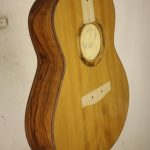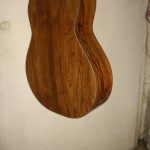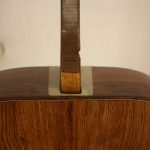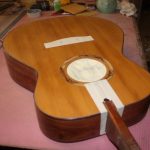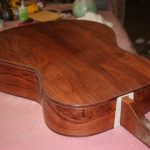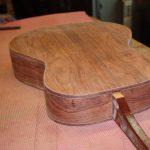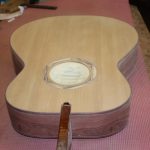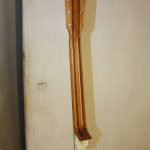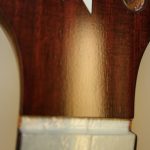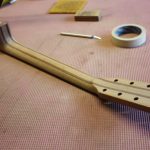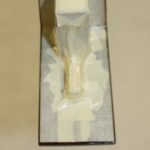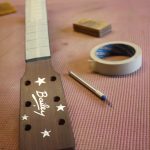…Finishing…
Read Part1, Part 2, Part 3, Part 4
- The body will get 5 build coats then a finishing coat after ‘flatting’
- The first gloss coat has been applied
- The area where the neck touches the body is masked
- …the body is masked where the neck touches the body and under the bridge
- A sealer coat has been applied….
- A stick is attached to hold while spraying the body
- The soundhole is masked
- The neck is sprayed with 5 coats rubbing between coats and flatting before the last
- …the first coat sinks into the grain as is dries, which is why rubbing and flatting are necessary
- The neck ready for spraying
- Close-up of masking on neck heel
- The fretboard is masked up
Sandy had originally asked for an oiled finish but this guitar is so special I thought it deserved to be given the full gloss treatment. I only use nitrocellulose lacquer for my instruments as I believe it looks and sounds better than anything else that is available.
The rosewood used for the back and sides of the body has quite large open pores so first the grain was filled. Natural filler was coloured until it matched the body and then applied with a plastic scraper. The excess is removed quickly with a clean scraper before sanding.
I masked the sound hole and then a coat of sealer was sprayed. After this the body was masked where the neck and bridge will be attached. These will be glued so a good wood to wood contact is required. The sealer coat is easy to remove and prevents the masking tape from ripping the delicate fibres of the soundboard when the tape is removed later.
Next five coats of gloss was applied over two days with plenty of time in between for drying and the surface was rubbed with a scotchbrite pad each time between coats.
After three days rest the surface was sanded flat with 400g before applying the last finish coat. Now it will hang for as long as possible before polishing….It has to be finished for Sandy to take with him on his move to New Zealand so I will have to check the diary!

